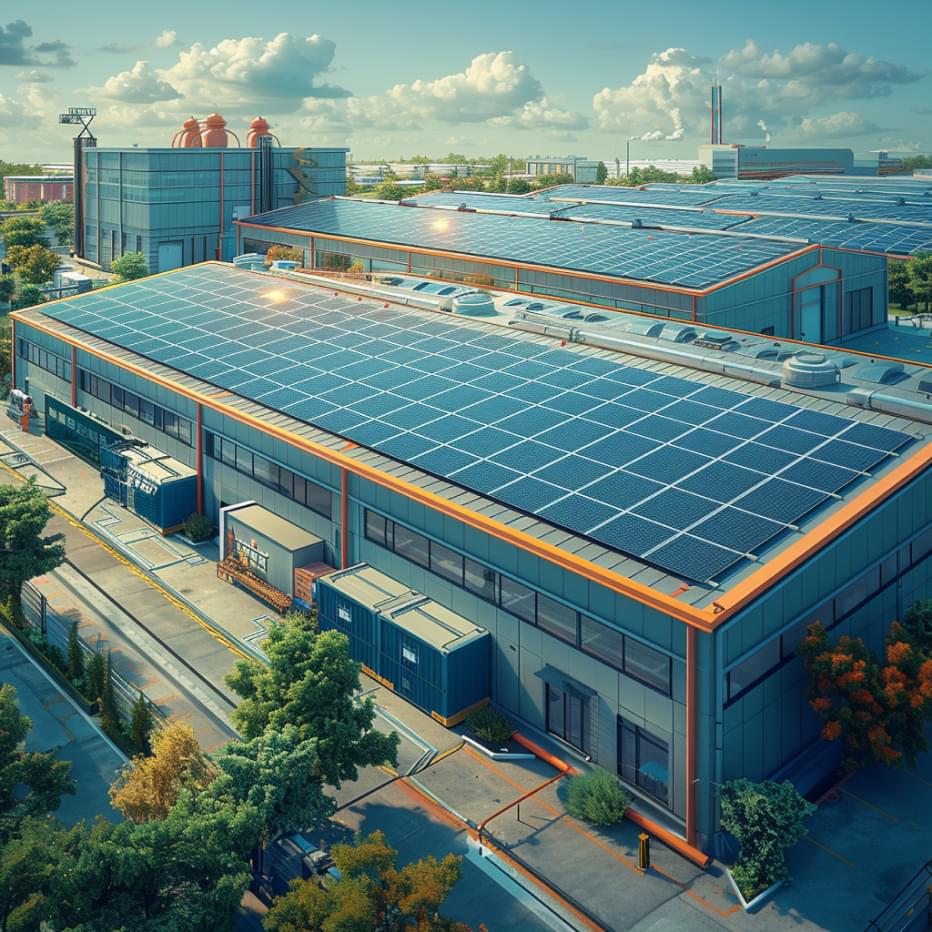Projects by Monetec GmbH
Projects by Monetec GmbH
In this section, all ongoing and planned projects of the Monetec company will be presented in the future, complete with all essential information and details. All projects listed here are part of the STO portfolio of Monetec GmbH and contribute to the company's overall return, in which all investors participate through the ownership of the MTC tokens.
Our security token offering portfolio
All our projects are not limited to photovoltaic systems only; we generally focus on the sectors of renewable energy and real estate, and will have various projects in these areas on the European market. Therefore, projects will be categorized into several groups in the future, ensuring that, in addition to regular reporting, it is transparent and clear where all funds are headed. Below, you can see a few examples of the potential projects in which we plan to operate.

Photovoltaic systems
One of the largest and most important areas for our projects will be photovoltaic systems and everything related to them. Not only because we expect the market to offer many exciting opportunities in the coming years, but also because we have the most experience in this area on the German market. Through the flexibility of tokenization, we are able to consider many sub-areas simultaneously.
Firstly, we can initiate the planning and construction of new systems, including through cooperation with our partner companies, and later benefit from the profits of electricity sales after their completion. Additionally, we can acquire existing and already operational systems, incorporate them into our portfolio to benefit from the electricity sales, or resell them to other market participants as part of a trading deal and benefit from the sales proceeds.
On the other hand, we are not limited to the systems as a whole but can also consider all subsections of these assets. For example, we can acquire and sell or possibly lease parts of the systems or components, such as the PV modules themselves or PV transformers, which are typically needed for systems starting from 200-300 kWp in rooftop installations and are highly profitable in operation.
Another very exciting sub-area of photovoltaic systems is the area of system certifications. The background is as follows: In order for systems to be officially operated within all regulations, they must be checked in all technical aspects before being connected to the grid. Due to the expansion of renewable energies in recent years, the demand for certifications at official certification bodies has increased immensely, causing system certifications to take months to even years before a system can be officially connected to the grid, at least in the German market. These certification processes can vary slightly across the EU but generally take a long time to complete. In Germany, the certification process includes specific categories such as Category A for initial technical assessment and Category B for comprehensive evaluations including efficiency and environmental impact, with Category B taking the longest time to complete. Some market participants are already recognizing the opportunity in this and are organizing their own official certification bodies, sometimes with better software and AI systems, to capture part of the market potential. We are also analysing this sector and could become certifiers ourselves in the future, although many steps are necessary for this, so this sub-area could, if at all, only be added in the coming years.

Grid operation
Another potential additional branch of our business activities could eventually evolve into grid supply operations and electricity sales as well. In several European countries, such as Austria and Spain, it is already possible to buy and sell electricity independently from central energy suppliers through energy communities. These energy communities, supported by the European Union’s Renewable Energy Directive II (RED II) and the Electricity Market Directive (EMD), allow various participants to jointly generate, store and consume renewable energy.
In a Renewable Energy Community (REC), local and regional participants such as individuals, companies and municipalities can collaborate to efficiently use and market surplus energy. These communities benefit from reduced grid tariffs and exemptions from certain charges, especially when using photovoltaic systems. A Citizen Energy Community (CEC) has similar goals, but without the necessity for all participants to be in the same network area, thus providing greater flexibility.
The implementation of these directives varies across EU member states. For instance, in Germany, the establishment of energy communities is progressing, though it faces bureaucratic and economic challenges. While Germany has integrated some aspects of the EU directives into national law, full implementation remains a work in progress. Conversely, Spain has made significant strides, particularly after abolishing the "sun tax" on self-consumed solar power in 2018, and has since aligned its national regulations closely with EU guidelines.
These developments open up numerous promising opportunities. Specifically, it allows the sale of electricity generated from our own installations independently and at better conditions. Additionally, this electricity can be utilized for our own projects, offering high flexibility and economic efficiency.

Real estate
Another promising area we aim to focus on more is the real estate sector. As described in our classic business model under the "About Us" section, photovoltaic projects are always closely linked with real estate matters, as a photovoltaic system must be placed on a suitable surface. This can involve either rooftop installations or ground-mounted systems. In both cases, real estate aspects play a central role.
In many previous and current projects of our partner companies, the surfaces to be developed are typically leased for longer periods, usually 20-30 years, under a lease agreement. The owners benefit from rental income and/or prior renovation of their surfaces. Instead of just leasing these surfaces, we could purchase the properties outright, provided it is economically viable. We could then, for example, renovate these properties and either sell or lease them to other market participants. This would allow us to expand our business beyond the purely energy sector and combine it with real estate, significantly increasing the potential return.
Especially in Mallorca, Spain, there are currently many exciting and promising opportunities to realize these plans. Our partner companies have already successfully acquired, renovated and equipped properties there with photovoltaic systems following this exact model, resulting in a significant increase in the properties' value. Now, our partner companies could either sell the properties in the future for a large profit or rent them out to ensure a steady income over the years.
As the character Harry Sonneborn said to Ray Kroc in the film "The Founder" regarding the franchise properties of the first McDonald's locations: "You don’t build an empire off a 1.4 percent cut of a 15-cent hamburger. You build it by owning the land upon which that burger is cooked." – Similarly, we want to leverage this additional business field of real estate for ourselves. And who knows, perhaps over time, the side business of real estate will prove so successful that it becomes an independent business model for Monetec. Time will tell.
Much more to come
We are committed to continuously exploring new and exciting areas and business fields within the renewable energy and real estate sectors. We will always consider adding projects to our portfolio as long as they present economically promising opportunities. We welcome everyone who wishes to join us on this journey.
